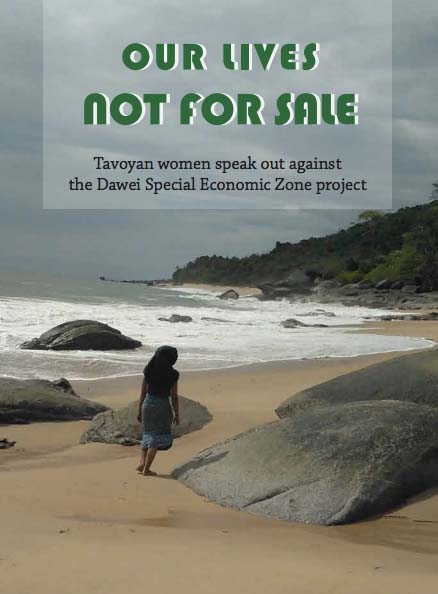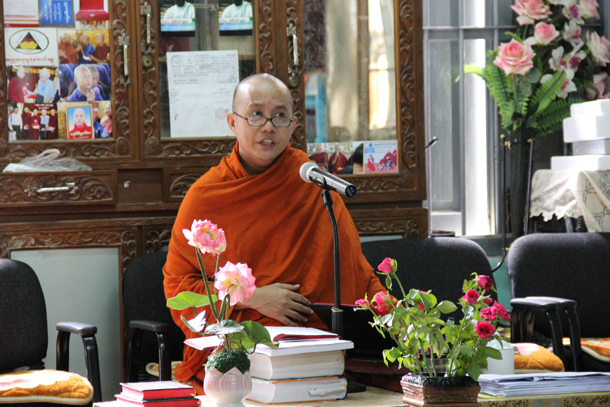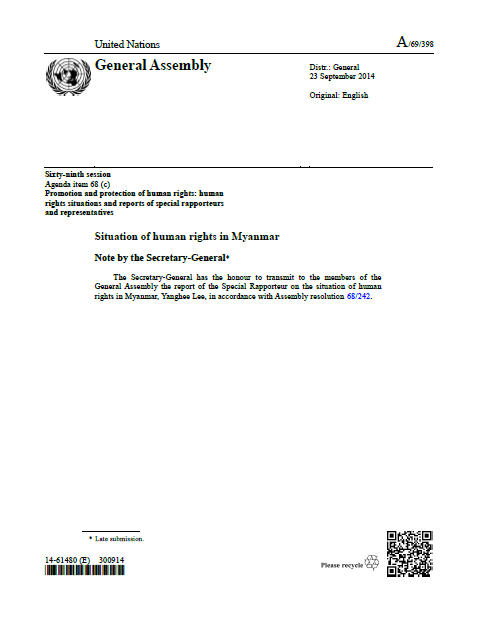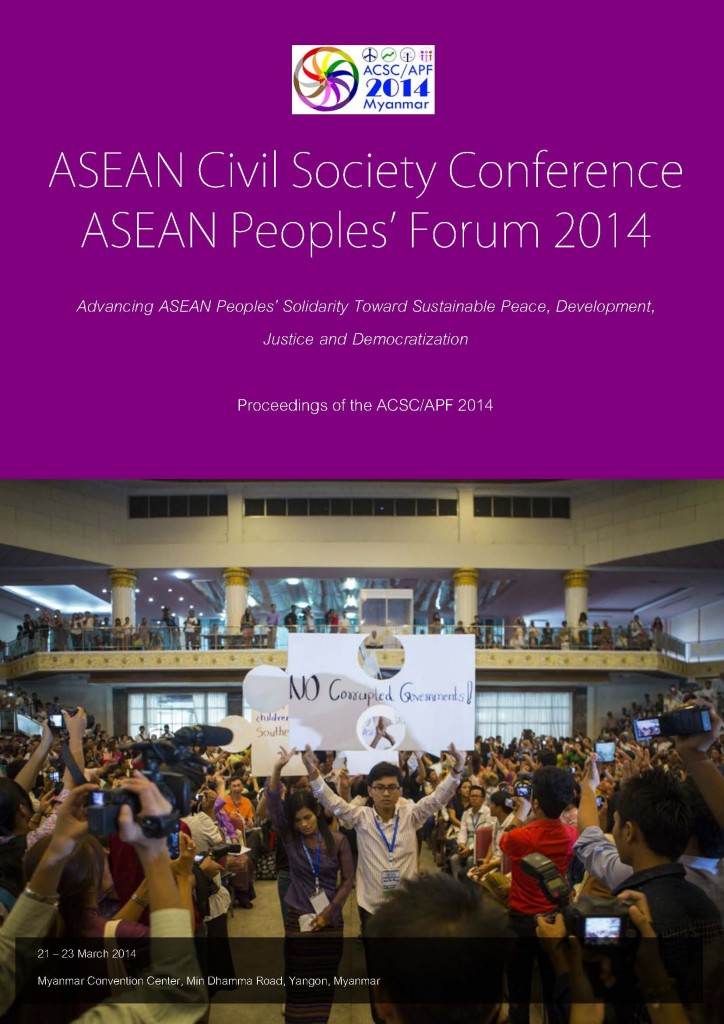Posts Tagged ‘CEDAW’ (23 found)
ASEAN Parliamentarians Welcome Announcement of Myanmar Election Date, but Raise Concerns Ahead of the Vote
JAKARTA, 10 July 2015 – ASEAN Parliamentarians for Human Rights (APHR) today welcomed Myanmar’s announcement of a date for its long-awaited general election, but warned that a nationwide vote alone was not enough to guarantee the country’s continued transition to democracy […]
• • •ASEAN, International Community Must Prioritise Rohingya Women and Children in Crisis
The Women Peace Network – Arakan (WPN-A) urgently calls upon the international community, including ASEAN governments, to act immediately to save and protect the Rohingya women and children who are currently trapped at sea […]
• • •Our Lives Not For Sale: Tavoyan Women Speak Out Against the Dawei Special Economic Zone Project
 This report exposes the damaging impacts of the Dawei Special Economic Zone (DSEZ) project on rural Tavoyan women living in six affected villages in southern Burma. Most of the local population are fisherfolk and farmers, who have lived sustainably for generations in this isolated coastal area. They have been given no choice about accepting this multi-billion dollor Thailand-Burma joint venture, which will turn their pristine lands into the largest petrochemical estate in Southeast Asia […]
This report exposes the damaging impacts of the Dawei Special Economic Zone (DSEZ) project on rural Tavoyan women living in six affected villages in southern Burma. Most of the local population are fisherfolk and farmers, who have lived sustainably for generations in this isolated coastal area. They have been given no choice about accepting this multi-billion dollor Thailand-Burma joint venture, which will turn their pristine lands into the largest petrochemical estate in Southeast Asia […]
‘If they had hope, they would speak’: The Ongoing Use of State-Sponsored Sexual Violence in Burma’s Ethnic Communities
In January 2014, the Women’s League of Burma (WLB) published a report which demonstrated the systematic use of rape by the Burma Army as a strategy to subjugate communities across the country. We documented over a hundred cases of sexual violence in the years since President Thein Sein took office – a number which we believe grossly underestimates the true scale of the problem. Drawing on evidence gathered by our member organisations across Burma, we argued that there are clear links between militarisation, investment and human rights abuses. We also proposed a number of steps to uproot the culture of impunity which surrounds sexual violence, and prevents survivors from obtaining justice. Whilst recent months have seen positive action taken in several areas, the pillars which provide impunity for perpetrators of human rights abuses remain in place. In January, we called for constitutional reform to place the military under civilian control; the establishment of effective judicial and non-judicial mechanisms to investigate human rights abuses, particularly those relating to sexual violence, and; greater participation of women in the peace process dialogue. […]
• • •Statement: Civil Societies’ Review on Myanmar’s Transition Process: Prospects for 2015 and Beyond
We, more than 650 representatives from 257 organizations and networks in Myanmar, came together in Yangon for 3 days from 14-16 October 2014 to exchange opinions, debate and to assess a wide range of issues currently confronting Myanmar in the context of recent political developments and the transition process that started in 2011 […]
• • •69th Session of the UN General Assembly – Situation of human rights in Myanmar: Report of the Special Rapporteur on the situation of human rights in Myanmar
I. The mandate of the Special Rapporteur on the situation of human rights in Myanmar was established pursuant to Commission on Human Rights resolution 1992/58 and recently extended by Human Rights Council resolution 25/26. The present report is submitted pursuant to Council resolution 25/26 and General Assembly resolution 68/242.
II. Background
2. Following the completion of the term of the previous mandate holder, the current mandate holder took up her functions only in June 2014, which resulted in a shorter period than usual to conduct a country visit and review the information gathered. The present report therefore sets out the Special Rapporteur’s preliminary observations, to be supplemented by her oral statement to the General Assembly […]
• • •ACSC/APF 2014 Post Conference Report
As a member of the Association of Southeast Asian Nations (ASEAN), Myanmar accepted the gavel that symbolizes the ASEAN presidency. This was a historic moment since this is the first time Myanmar has taken the Chair since it became a member of ASEAN. As Chair, Myanmar is responsible for hosting many important regional forums and events during 2014.
The ASEAN Civil Society Conference (ACSC), also known as the ASEAN Peoples’ Forum (APF), is held independently by the ASEAN Chair country in advance of, and parallel to, the official ASEAN Summit, which is attended by ASEAN and regional leaders. The first ACSC/APF took place in Malaysia in 2005. Since then it has taken place in the Philippines (2006), Singapore (2007), Thailand (2009), Vietnam (2010), Indonesia (2011), Cambodia (2012), Brunei (2013) and this year in Myanmar (2014). The 10th ACSC/APF took place on 21 – 23 March 2014 at the Myanmar Convention Center in Yangon, Myanmar.
• • •Statement of the Special Rapporteur on the Situation of Human Rights in Myanmar
Introduction:
Good evening and thank you all for coming today. I have just concluded my first official ten- day mission as Special Rapporteur on the situation of human rights in Myanmar. The objective of my visit was to assess the human rights situation in Myanmar through a better understanding of the realities on the ground. Accordingly, I sought to engage constructively with a broad spectrum of stakeholders, including Government officials, political, religious and community leaders, civil society representatives, as well as victims of human rights violations and members of the international community. I was pleased to have had a frank and open exchange of views on a range of matters related to my mandate. And I am grateful that many were so forthcoming in their views on sensitive issues […]
• • •Burma Parliament Must Reject Dangerous Religious Conversion Law
 The introduction of the draft Law on Religious Conversions (the Law) – published in full in Burmese in state media on 27 May 2014, for the consideration of Parliament and the public – has justifiably triggered a torrent of criticism over the past few days, at national, regional and international levels. Human Rights Watch has urged the Burma Parliament to drop the Law, while the Asian Human Rights Commission has called for “the strongest opposition to the Law, both in the public domain and in the legislature.”
The introduction of the draft Law on Religious Conversions (the Law) – published in full in Burmese in state media on 27 May 2014, for the consideration of Parliament and the public – has justifiably triggered a torrent of criticism over the past few days, at national, regional and international levels. Human Rights Watch has urged the Burma Parliament to drop the Law, while the Asian Human Rights Commission has called for “the strongest opposition to the Law, both in the public domain and in the legislature.”
Part of a package of four bills which comprise measures to “protect race and religion,” the Law is the product of a very powerful lobby in contemporary Burma, namely a coalition of Buddhist monks known as the “Organization for the Protection of Race, Religion and Belief” (the OPRRB), which has been petitioning President Thein Sein and the Burma Government to address the simmering issue of race and religion since religious and communal tensions first broke out in Arakan State almost exactly two years ago. One of the leaders of the OPRRB, Tilawka Biwuntha, told Radio Free Asia that his organization were pleased with the introduction of the Law.
• • •Burma: Drop Draft Religion Law
(New York) – Burma’s parliament should scrap a proposed religion law that would encourage further repression and violence against Muslims and other religious minorities, Human Rights Watch said today. The draft law on religious conversions, published in the state-run media on May 27, 2014, would impose unlawful restrictions on Burmese citizens wishing to change their religion […]
• • •











 All posts
All posts